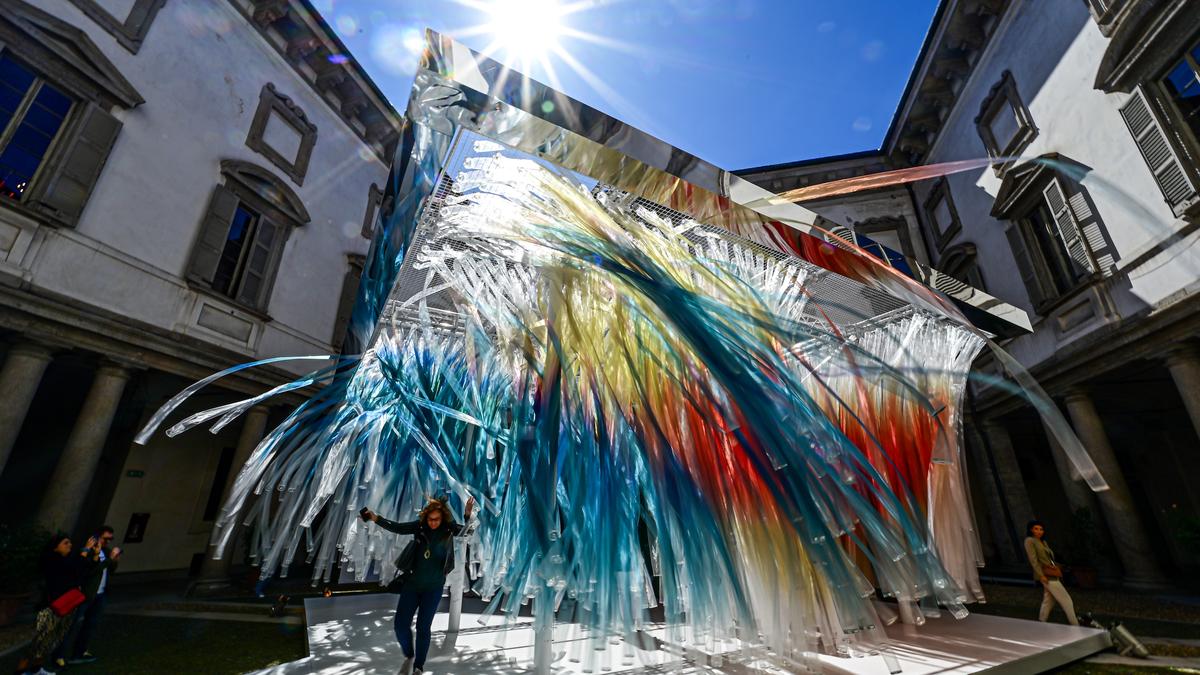
Arvind Kejriwal has been allowed to carry three books with him to jail. He’s chosen the Bhagavad Gita, the Ramayan and Neerja Chowdhury’s How Prime Ministers Decide.
Whether the Delhi chief minister wants to actually read these books or he wants to be seen as wanting to read these books is anyone’s guess. Kejriwal is well-known for his penchant for political theatre, after all.
Yet there is something profoundly telling about the books we turn to when we are cut off from the rest of the world. These are our Desert Island Discs, that famous BBC Radio 4 show where guests had to come up with songs they would carry with them if they were marooned on an island somewhere. Within the loneliness of jail, where most of the time you are in isolation, battling the voices in your head, these books might be your only real companions.
Growing up as a bookish boy who was hopeless at sports, I can understand the power of book companions. Early in the morning, when the house was yet to stir, I would sneak up on to the window sill in the bedroom I shared with my sister and curl up there with my book, drawing the curtains around me, careful not to disturb anyone. That hour or so of me-time with my book, hidden from the world behind the curtains, was precious beyond words. It ignited a lifelong love affair with books. Every time I travelled abroad, I carefully selected the books I would read during the flight. Recently I came back from a trip to the US, and realised, to my chagrin, that with so many on-demand in-flight entertainment options, I had not read any of the books I had carried. As I took the books and the unused bookmarks out of my carry-on bag, I felt a pang as if I had betrayed an old faithful.
Of course there is no comparing a transatlantic flight, however long, with indefinite judicial custody. But How Prime Ministers Decide is an interesting choice for Kejriwal. The book opens with a scene with which many politicians in crisis would empathise. And it involves books.
Indira Gandhi is sitting under a jamun tree in the back lawn of her bungalow on Safdarjung Road in Delhi. It’s April 1977. Her party has just been trounced in the election and she has lost in her own constituency of Rae Bareli. She tells her visitors Kapil Mohan and Anil Bali of the Mohan Meakin liquor company that she is thinking of disappearing into the hills to some place with a small spring, surrounded by trees.
“I can spend the rest of my life there. And I can read books.”
“Madam, will you write a book?” Bali asks her.
“Maybe, but then who will want to read my memoirs?” she says morosely.
Mrs Gandhi never got a chance to write those memoirs though her father’s letters to her from prison remain a classic. Other figures in Indian history also used their jail time not just to read but also write—Mahatma Gandhi, Jayaprakash Narayan, Veer Savarkar and Bhagat Singh, to name a handful.
In another time and in another prison, but much in the same vein, Nelson Mandela wrote Conversations With Myself. Alexander Solzhenitsyn, sent to labour camp for criticising Stalin, wrote what became One Day In The Life Of Ivan Denisovich on whatever scraps of paper he could find. As prisoners of conscience, they had a sense of haloed righteousness. Mrs Gandhi, who had lost an election because of the taint of the Emergency, felt she was a reviled figure.
Not all prisoners spend their time writing philosophical introspective memoirs about the meaning of life. Marquis de Sade wrote the very erotic Justine in 1791 to while away the boredom of prison life. Sir Thomas Malory was awaiting trial for rape in the 1450s when he wrote his famous Le Morte d’Arthur about the chivalric King Arthur. And Miguel Cervantes’ Don Quixote was conceived in debtors’ prison. So Kejriwal has many genres to choose from if he puts pen to paper.
Kejriwal might be looking for realpolitik inspiration in the story of Mrs Gandhi’s return or seeking spiritual solace in the Gita. One can see how books about princes in exile and princes on the battlefield might appeal to a beleaguered politician. But it also surprises me that at a time of such great personal turmoil one would also not choose books that provide a different kind of comfort, something both familiar yet untaxing, a distraction for the mind.
When I was stuck in bed for weeks recovering from jaundice, I could have finally read all those doughty classics on my to-read list, like War And Peace and Moby Dick. But I realised I wanted the comfort of old favourites—Agatha Christie detective stories and Gerald Durrell animal books. They were like chicken soup for the soul, part book, part balm and as long as Hercule Poirot or Miss Marple could solve that murder, there was reassurance that the world had not fallen completely apart. It was like having old friends visiting, telling familiar stories with well-worn punchlines but in a time of uncertainty you relished them all the more because you knew how they ended.
That’s why it made perfect sense when I read that veteran journalist Gautam Navlakha, accused in the Elgar Parishad case, had requested a copy of The World Of Jeeves And Wooster in jail in 2022. What was amusing was that it was initially denied as a “security risk” until the Bombay high court stepped in. Many were mystified by his choice but I can see how the idyllic world of Wodehouse might provide some droll comfort in trying times.
I have a close doctor friend who to this day re-reads Wodehouse as a stress-buster. As the writer Evelyn Waugh once said, Wodehouse never grows old because he continues to “release future generations from captivity that might be more irksome than our own”. In Navlakha’s case, that captivity was only too real.
We take books for granted. Until they are rationed and proscribed, we don’t realise their power. Trade unionist and lawyer Sudha Bharadwaj, accused in the Bhima Koregaon case, needed a special National Investigation Agency court order to be allowed five books from outside every month.
Novelist Leslie Schwartz was sentenced to 90 days in Los Angeles county jail in 2014 for charges related to driving drunk after double-digit years of sobriety. Schwartz later wrote in the literary portal LitHub that it was books that kept her from falling apart. She was allowed three books a week from outside but also read the books other inmates had left behind. She wrote the arrival of the books was “better than sex. Better than drugs or alcohol”. Every time she opened a book, she would breathe in the paper and the glue and “imagined my entire cell filling up with the words inside”. Most importantly, she had to learn how to read every word slowly, to savour them just to make the book last longer. As long as the book lasted, it could block out the sounds of the jail, the sentences on the page somehow making her forget for a little while the sentence she was serving. “Books can break your heart, but they never leave you,” she wrote.
At a time when I am at my loneliest, forsaken by many allies, I would be thankful for that service. But one must choose wisely. The great actor Soumitra Chatterjee was once asked what books he would want to carry into his afterlife. He said one without question would be Rabindranath Tagore’s Gitabitan since his poetry had been his lifelong companion, in sorrow and joy. The other he chose later in life was Abol Tabol, the book of nonsense verse by Sukumar Ray. He felt that its whimsy and nonsense was just what he needed in the forever.
The books that accompany us in our loneliest hours don’t have to always reveal to us the deep meaning of life. Sometimes they can offer something far more precious—comfort. As the ABBA song goes, “You and I can share the silence, Finding comfort together, The way old friends do.”
Cult Friction is a fortnightly column on issues we keep rubbing up against.
Sandip Roy is a writer, journalist and radio host. He posts @sandipr
Source | Powered by Yes Mom Hosting





